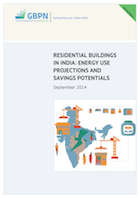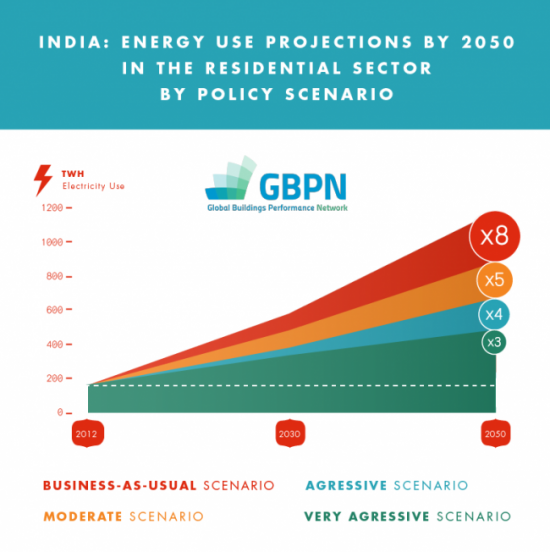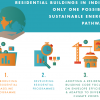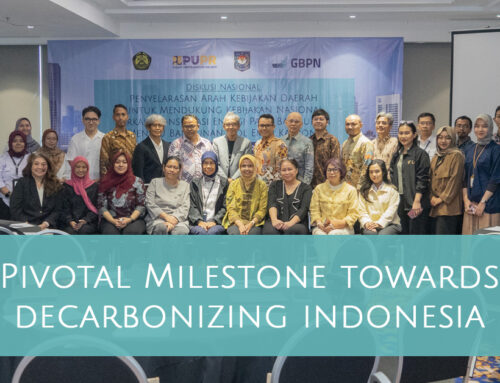[Report] Residential Buildings in India: Energy Use Projections and Savings Potentials
This new GBPN report jointly developed with the Centre for Environmental Planning and Technology (CEPT) University, provides a first attempt to document energy saving potentials that could be achieved in India by 2050 in the residential sector. Four energy scenarios have been developed to identify the potential energy savings, each relating to a level of ambition of building performance policies and market efforts. With direct policy action, it is possible to substantially reduce future energy demand in the residential sector and help India address current challenges posed by the population growth, higher comfort expectations and the increased use of appliances.

In the context of the publication of the ‘Energy-Efficient Design Guidelines for Multi-Storey Residential Buildings’ by the Indian Government on 2 September 2014, this new study provides decision makers with recommendations about future actions to achieve deep energy savings from the residential building sector while generating a wide range of positive economic, environmental and social opportunities.
The report investigates four possible residential electricity consumption projections up to 2050 compared to today’s levels: business-as-usual, moderate, aggressive and very aggressive. The study specifically focuses on assessing the role of the building envelopes in relation to comfort air conditioning systems and appliances in order to ensure energy efficient dwellings for urban and rural residential sectors. Under the business-as-usual scenario, electricity consumption could rise by more than eight times by 2050 compared to 2012 levels. However, using focused policy and market efforts, the moderate, aggressive, and very aggressive strategies can respectively limit the consumption increases to five times, four times and three times the current energy use, which would represent relative energy savings of 27%, 44%, and 57% compared to business-as-usual (Infographic: Main findings of the Report).

To achieve the potentials, the report identifies the following recommendations for action:
- Better Data: Introduction of a residential baseline energy data programme using a large survey to provide a detailed picture of current residential energy consumption patterns;
- Policy Roadmaps: Elaboration of policy roadmaps that can support the implementation of energy efficiency measures for residential buildings;
- Residential Building Energy Code: Development of a specific code focussing on residential building envelope efficiency adapted to the different climate zones to realise the saving potentials of all building envelope components to address the rising demand for thermal comfort.
The report fils the current knowledge and data gap in the residential sector in India. A high quality field survey of 800 households was conducted by CEPT University in order to map current penetration rate of appliances and better understand electricity consumption patterns for different sizes of residential units with varying occupancy rates, appliances and for four different climate zones of the country. Based on the building energy modelling, comfort benefits and energy savings potentials of better-performing building envelopes were quantified using the “Energy Conservation Building Code” (ECBC) envelope characteristics.
The report was released on 23 September at the occasion of the Conclave on Green Architecture – “Building Sense: Towards Sustainable Buildings and Habitat” – organised by the Centre for Science and Environment in New Delhi (www.cseindia.org).
Documents
![]() 02. India2014_Briefing.pdf
02. India2014_Briefing.pdf![]() 03. INDIA Baseline_ES.pdf
03. INDIA Baseline_ES.pdf![]() 08. INDIA Baseline_TR_low.pdf
08. INDIA Baseline_TR_low.pdf![]() INFOGRAPHIE_PPT.pdf
INFOGRAPHIE_PPT.pdf![]() INFOGRAPHIE.pdf
INFOGRAPHIE.pdf
Related News
Related Report Bundles
Share This Story, Choose Your Platform!
Stay in touch with how we’re transforming the buildings sector
GBPN runs innovative building policy reform programs in key regions around the world that aim to tackle the climate emergency by decarbonising the buildings sector. Stay up to date with our newsletter.
Stay in touch with how we’re transforming the buildings sector
GBPN runs innovative building policy reform programs in key regions around the world that aim to tackle the climate emergency by decarbonising the buildings sector. Stay up to date with our newsletter.







